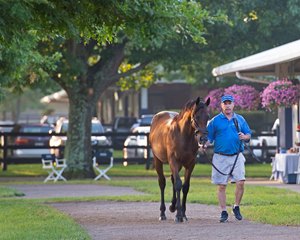Optimism in the Air as Yearling Sale Season Begins


Coming off a record juvenile sale season in which gross receipts topped $200 million for the first time with the U.S. and world economies humming along, there is an air of optimism on the Lexington sale grounds at Fasig-Tipton this week.
The July Sale, for which 364 selected yearlings have been cataloged, kicks off the yearling sale season that continues through October. As of early Monday, 37 horses had been withdrawn from the sale that begins July 9 at 10 a.m. EDT.
Last year's sale saw 196 yearlings average $100,829 on gross receipts of $19,762,500, with a median price of $75,000, topped by a Flatter colt purchased by Al Rashid Stable for $520,000 from Lane's End, agent. The 86 head that went unsold represented a moderate RNA rate of 30%.
The July Sale, which is the first opportunity for public auction buyers to evaluate yearlings by first-crop sires alongside offspring of more established stallions, is among the top venues for horses who have gone on to big-race success.
According to BloodHorse MarketWatch data for 2014-16, there were 32 stakes winners sold at the July sale, representing 5.8% of the 453 sold. The 2014-26 editions of the sale produced 13 graded/group stakes winners (2.4% of total sold). Sale graduates also have included 110 winners at 2, a sign of early precociousness.
"I feel very optimistic and am encouraged as we kick off the yearling sale season," said Fasig-Tipton president Boyd Browning. "We have a strong catalog with a very good mix of proven sires and an exciting group of proven stallions represented.
"We've seen a strong start to the year with the 2-year-old sales and all economic indicators are positive. So we're bullish as we kick off the yearling market."
While Fasig-Tipton no longer segments yearlings by freshman sires as it did at one time, those horses still command the attention of buyers who remember the horses' on-track success.
"It's an exciting and pretty diverse group of horses in terms of sire lines and racing performance with first crops that are yearlings of 2019," Browning said. "Hope springs eternal. You might recall having seen some of these horses race and might have had a favorite and would be more inclined to buy an offspring of one of those."
With the boutique summer meets ready to begin at Del Mar and Saratoga Race Course, there is a feel-good mood on the Fasig-Tipton sale grounds as the industry puts behind the storm clouds that hovered during the first half of 2019 when a rash of equine deaths at Santa Anita Park generated an outpouring of negative publicity.
"We are heading into two of the most enjoyable race meets in the country and I think people are very enthusiastic and optimistic," Browning said. "We have to be cognizant of some issues our industry faces and we have to figure out how to address those as an industry. The fear factor has been greatly reduced within the marketplace."
"I think we're looking at a strong yearling market," said Kerry Cauthen of Four Star Sales, adding that issues the industry faced earlier this year have led to some introspection. "We've always got to be willing to open our eyes and do better and I think everybody is responding accordingly. Everybody is becoming keenly aware; it's a social media world we have to work within."
As the year's first yearling sale, the best prospects in July are those that are further along in their development, Cauthen said.
"It needs to be a horse that gets people excited this early in the yearling season," he said. "You have to have a horse that moves very well, is uncomplicated, and can't have a lot of X-ray issues, and you have to be a real athlete."
While foals produced earlier in 2018 would figure to have a growth advantage, it's not always that simple, he explained.
"Typically, they will be an earlier foal, but sometimes you can find an athletic May foal in which people can see its upside," Cauthen said. "They will say, 'This is a horse that is much more advanced for a May foal than you would expect, so can you imagine what it's going to look like in three months?' That's the blue sky sale. Those horses can do fantastically, too."
"You definitely want something that is mature; you don't want a backward horse because every week they are trying to play catch-up," said Mark Taylor of Taylor Made Sales Agency. "I don't like bringing May or late April foals. I like bringing horses that are a little more forward and ready for the sale process."
Taylor also has steered Taylor Made's consignment away from presenting marginal horses within the July marketplace.
"We don't want to bring inferior physical horses here and Fasig does a good job of screening those horses out," he said. "In the past we've been able to beg them into taking some of those horses, but over 25 years our batting percentage on those horses was zero.
"I have set the bar with our team that if a horse vets good and everything else comes together, we want it to be at least a solid $50,000 yearling. You never bat 1.000, but in general we have a lot of B-plus horses in our sale, which means it's a nice, above-average horse."
